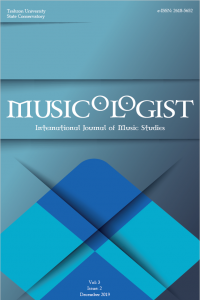Abstract
References
- Anikin, Vladimir. Prokopyevich. (1997). “Непостфольклор, а фольклор (к постановке вопроса о его современны хтрадициях” (Not ‘post-folklore’ but ‘folklore’ (to the question of its contemporary traditions) [Proceedings of the scientific-practice conference: Slavic traditional culture and the modern world]. Dobrovolskaya, Varvara Evgenyevna (Ed.), (pp. 224-240). Moscow: State Republican Center for Russian Folklore.
- Chkhikvadze, Grigol. (1961). “თანამედროვე ქართული მუსიკალური ფოლკლორი.” (Georgian Contemporary Musical Folklore). Tbilisi: Society for the dissemination of political and scientific knowledge of the Georgian SSR.
- Chkhikvadze, Grigol. (1981-1982). “კრიმანჭული ქართულ ხალხურ სიმღერებში და მისი ნაირსახეობანი.” (Krimanchuli in Georgian Folk Songs and Its Diversities). Tbilisi: Manuscript of Tbilisi State Conservatoire.
- Gabisonia, Tamaz. (2014). “Критерии „аутентичности”в грузинском народном музыкальном исполнительстве” (Criteria of ‘Autenticity’ in Traditional Georgian Musical Performance). Belgrade: Musicology, a peer-reviewed journal of the Institute of Musicology of Serbian Academy of Sciences and Arts.
- Gabisonia, Tamaz. (2015). ავტორი ქართულ ეთნიკურ მუსიკაში. (The Author in Georgian Ethnic Music), The Issues of Performance Folk and Church Music. [Giorgi Garaqanidze X International Festival of Folk and Church Music in Batumi]. Managadze, Khatuna (ed.), (pp. 145-163). Batumi: Music Faculty of Batumi Art State University.
- Garaqanidze, Edisher. (2007). რჩეული წერილები. (Featured Letters). Manana Akhmeteli (Ed.). Tbilisi: Georgian Music Society.
- Piotrowska, Anna. (2010) “World Music and Traditional Music. The Problem of Authenticity”, [The Fourth International Symposium on Traditional Polyphony, Proceedings], Tsurtsumia, Rusudan, and Jordania, Joseph. (Eds.), (pp. 581-589). Tbilisi: International Research Center for Traditional Polyphony of Tbilisi State,
- Tsurtsumia, Rusudan. (2010). “Georgian Polyphony in a Modern Socio-Cultural Context”. (The Fourth international Symposium on Traditional Polyphony). Turtsumia, Rusudan and Jordania, Joseph (eds.), (pp. 622-636). Tbilisi: International Research Center for Traditional Polyphony of Tbilisi State Conservatoire.
- Zemtsovsky, Izali. (1977). “Народная музыка и современность (К проблеме определения фольклора” (Folk music and modernity (On the problem of determining folklore)), Modernity and folklore: articles and materials. in Gusev, Victor and Gorkovenko, Aleksandr (comp.), (pp. 28-75). Moscow: Music.
Abstract
Mass character and class reference of Soviet
art quite easily echoed collective and national priorities of Georgian folk
song. In addition, the authority of renowned singers and organizers of choirs
was an important factor for preserving the originality in Georgian colonial
cultural life, even before the establishment of Soviet Power. From the second
half of the 19th century these popular leaders – choir masters – created their
own versions of folk songs, as well as composed new songs, most of which,
despite clear stylistic individualism, are considered ‘true folklore’ by the
lovers of authentic folklore today.
However, the songs composed by well-known
choirmasters in the second half of the 20th century, are demonstratively
rejected by the folklore elite, including official structures, for being
‘nonfolklore’ and ‘low quality’. But, stable popularity of these songs in
cities and villages, provides very strong evidence of their artistic and
stylistic relevance.
Thus, the policy of ‘ignoring’ could be
attributed to the maximalist understanding of ‘authentic’ performance of
folklore accompanying the national-independent movement in the 1980s, which
introduced an important cultural phenomenon of ‘revolutionary’ protest in
Georgian ethno-musical space. A similar tendency echoes the parallel realities
of post-Soviet countries and today’s fashionable ‘taboo’ of ‘all things Soviet’,
regardless of the verbal thematic of the examples.
In the inertia of these vicissitudes, currently
the practice of creating a song with ethnic coloring is dissociated from
‘authentic’ folk author-performers. But when it comes to the skill level and
traditional style, this suggests mostly inadequate results in a banished, but
free space.
The article discusses the boundaries and
accessories of the concept of “folk song”, its accordance with Georgian
traditional musical style, and the problems related to this topic. Also
presented is the classification scheme of Georgian musical styles based on contemporary
data.
References
- Anikin, Vladimir. Prokopyevich. (1997). “Непостфольклор, а фольклор (к постановке вопроса о его современны хтрадициях” (Not ‘post-folklore’ but ‘folklore’ (to the question of its contemporary traditions) [Proceedings of the scientific-practice conference: Slavic traditional culture and the modern world]. Dobrovolskaya, Varvara Evgenyevna (Ed.), (pp. 224-240). Moscow: State Republican Center for Russian Folklore.
- Chkhikvadze, Grigol. (1961). “თანამედროვე ქართული მუსიკალური ფოლკლორი.” (Georgian Contemporary Musical Folklore). Tbilisi: Society for the dissemination of political and scientific knowledge of the Georgian SSR.
- Chkhikvadze, Grigol. (1981-1982). “კრიმანჭული ქართულ ხალხურ სიმღერებში და მისი ნაირსახეობანი.” (Krimanchuli in Georgian Folk Songs and Its Diversities). Tbilisi: Manuscript of Tbilisi State Conservatoire.
- Gabisonia, Tamaz. (2014). “Критерии „аутентичности”в грузинском народном музыкальном исполнительстве” (Criteria of ‘Autenticity’ in Traditional Georgian Musical Performance). Belgrade: Musicology, a peer-reviewed journal of the Institute of Musicology of Serbian Academy of Sciences and Arts.
- Gabisonia, Tamaz. (2015). ავტორი ქართულ ეთნიკურ მუსიკაში. (The Author in Georgian Ethnic Music), The Issues of Performance Folk and Church Music. [Giorgi Garaqanidze X International Festival of Folk and Church Music in Batumi]. Managadze, Khatuna (ed.), (pp. 145-163). Batumi: Music Faculty of Batumi Art State University.
- Garaqanidze, Edisher. (2007). რჩეული წერილები. (Featured Letters). Manana Akhmeteli (Ed.). Tbilisi: Georgian Music Society.
- Piotrowska, Anna. (2010) “World Music and Traditional Music. The Problem of Authenticity”, [The Fourth International Symposium on Traditional Polyphony, Proceedings], Tsurtsumia, Rusudan, and Jordania, Joseph. (Eds.), (pp. 581-589). Tbilisi: International Research Center for Traditional Polyphony of Tbilisi State,
- Tsurtsumia, Rusudan. (2010). “Georgian Polyphony in a Modern Socio-Cultural Context”. (The Fourth international Symposium on Traditional Polyphony). Turtsumia, Rusudan and Jordania, Joseph (eds.), (pp. 622-636). Tbilisi: International Research Center for Traditional Polyphony of Tbilisi State Conservatoire.
- Zemtsovsky, Izali. (1977). “Народная музыка и современность (К проблеме определения фольклора” (Folk music and modernity (On the problem of determining folklore)), Modernity and folklore: articles and materials. in Gusev, Victor and Gorkovenko, Aleksandr (comp.), (pp. 28-75). Moscow: Music.
Details
| Primary Language | English |
|---|---|
| Subjects | Music |
| Journal Section | Articles |
| Authors | |
| Publication Date | December 31, 2019 |
| Published in Issue | Year 2019 Volume: 3 Issue: 2 |


